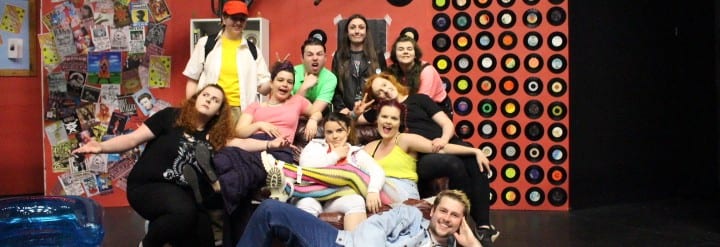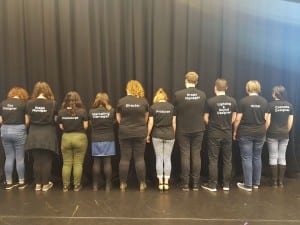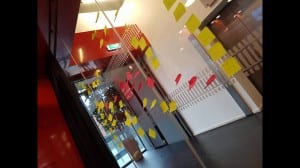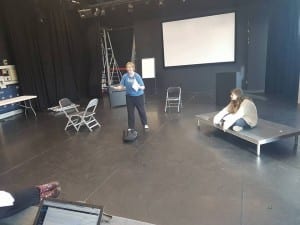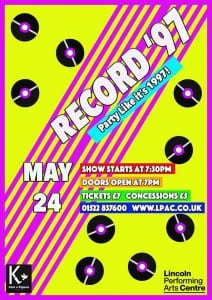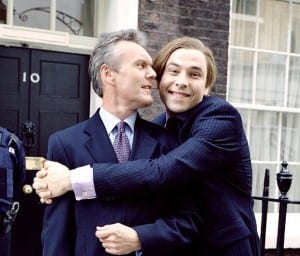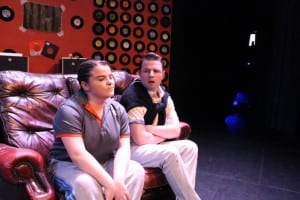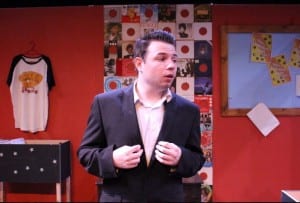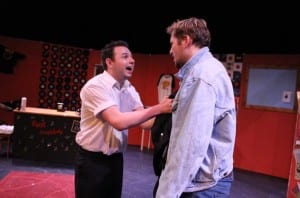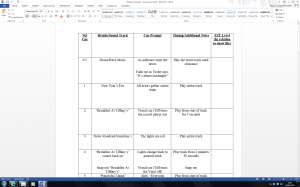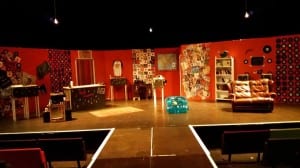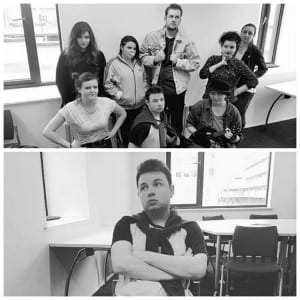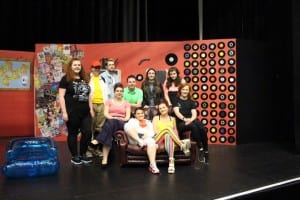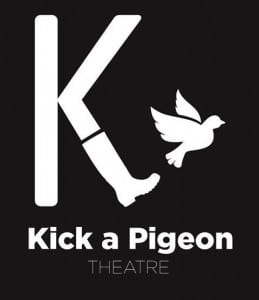Forming the Theatre Company
Out of everything I have done at University, forming a theatre company was overwhelming. However, it was a job that was easier than first expected. Originally, the five of us within the group knew before the semester began that we wanted to collaborate together and the idea of working with artistic people who are on the same wavelength that wished to form a piece of theatre we all had a passion for. However, it was overwhelming due to how many of us there were in the group and we thought we could do with having a few more. When the semester started, five other members joined us after they were searching to be in a theatre company.
Research and Development
We sensed that as a theatre company, it was essential to create a type of performance that was set in the 1990s because we loved the music and culture from that decade. We all sensed that we had connected to the 1990s and some of us had recollections from that decade, as we were all born in the 1990’s. As the sound designer, I started to research the different types of music from that decade because I was thinking that we could have some music playing while things were happening on stage to represent that we are basing our show in the 1990s.
In terms of research, we learnt a theatrical way of devising. As a lot of things happened during the 1990s, Flickbook Theatre demonstrated to us that it is quicker for us to pick a year out of that decade. We then individually wrote the important facts of that year on post-it notes (music, films, games, politics and technology) and then we presented our research to the rest of the theatre company. We then came to a vote on what the most important and the most memorable year of the 1990s. As a company, we discussed numerous ideas and explored certain actions what happened in 1997 to attempt to discover the basis of our performance.
As there were a lot of serious issues happening in that year which affected a number of people in the United Kingdom, we were thinking about escapism. Where do you go to escape? We individually discussed where we go to escape. I said I listen to music which changes the mood I am in. We finally came to a mutual decision about setting our performance in an outdated record store where eight misfits enter the record store to escape from the outdoors, regarding their current issues. As a group of peers, we established that we make each other laugh. Therefore, we intend to make other people laugh. So we decided to play to our strengths and create a script that reflects our strengths.
“Laughter is desperately needed in a world dominated by the spirit of seriousness, by fanaticism, intolerance, and fear” (Nelson, 1990, 1)
Especially when the characters are going through serious issues in their twenties, an age when they should be having fun.
Putting the Show together
The following choice we faced as a company was how to tell the story of eight misfits in a record store. The year 1997 spanned over twelve months, so fitting all events of that year into one hour would be an impossible task to make. However, a non-naturalistic style of theatre was embraced to incorporate the content and time jumps that would have to be involved in telling the story. We wanted the show the progress of the record store as time went on as the store was outdated and going down under. We did this by choosing one event out of each month and placing the events in the scene changes.
“Rehearsal time is when performances are created, an organic growing process when anything can happen, when different things happen in an unpredictable way, when actors make progress at different speeds” (Morrison, 2003, 99).
For the writers to gain an idea of what to write in the script, we as actors improvised some scenes. The director gave us a list of scenarios to act out. This was the director’s way of each character building a type of relationship with each other and them coming together to make a storyline within the context of the plot.
What is your Show title?
It took quite a short while for us to decide what the name the show was going to be. Knowing that the writer was creating a piece based on records in the year 1997, we thought we would make it simple. Therefore, we suggested Record ’97.
Being Sebastian Speeds
“Every part I play is just a variant of my own personality. No real character actor, of course, just me” (Michael Gambon)
I was always praised for portraying the comic role so it is necessary to finish my final performance with something the audience is going to enjoy. However, upon reading about comedy, I found that as an actor, it is my job to make the audience laugh and being in the moment. In other words, it is my job to perform the scenario as if it is a real life situation.
“In order to register these first impressions actors must be in a receptive frame of mind, a proper inner state. They must have the emotional concentration without which no creative process is possible” (Stanislavsky, 1989, 4).
In preparation for the role, I discussed with the company my thoughts and my overall objective during rehearsals.
The best part of the process for me was creating a back story for Sebastian. I based my character on David Williams’ portrayal of Sebastian from Little Britain and Michael Crawford’s portrayal of Frank Spencer from Some Mothers Do ‘Ave ‘Em. I was influenced by Sebastian’s flirtation skills towards the Prime Minister and Frank Spencer’s use of weeping and the camp reactions. My character of Sebastian was one of the comic characters out of the play, even though he had a dark background because of his sexuality and the feud with his dad. In his reality, his intention was to try and be a mature twenty-two year old and to do right to save everyone from being evicted from the record store. However, he was the opposite.
He was childish because of how spoilt he acted and he speaks before he thinks. Also being portrayed as a bisexual, Sebastian has a secret crush on his best friend David which he does not like to admit at the beginning because he is “not sure he swings that way” (Briggs, 2017).
Despite having eight misfits in a rundown record store and serious issues were happening, the show would not be comic without the characters’ personalities. For example, Sebastian made the audience laugh because of his innuendos and him being camp. The cast had very different styles of comedy and the characters created the Theatre of the Absurd. The skill of the straightforward characters to perceive the bizarre characters in a way where they recognize their ridiculousness made the audience burst into laughter.
My Production Role
As well as taking the role as one of the actors on stage, I also took a lead to a backstage role in order for the theatre company to run smoother. I am as well responsible for the technical side. I designed the lighting and sound for our show. I did this by associating the requirements of the script by working with the writers. In terms of what set was on stage, I had to work with the set designer of what ideas she had in mind of how much set there is going to be and what colour the flats are going to be. Furthermore, I had to also work with the director in terms of where the actors are going to be on stage for myself to plan out how the stage can be lit. The lighting was naturalistic as it was set in a record store, apart from the opening of the show as the audience were entering the auditorium which had neon disco lights which were to signify to the members of the audience that we were having a New Year’s Eve rave to start 1997.
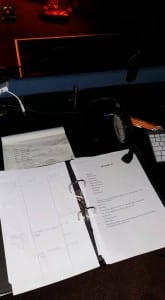
The tech script I designed for the technicians to operate the lights and the sound (Cockerill, 2017)
I found this job very overwhelming because I am doing it by myself and I have never done lighting and sound design before which affected the rest of the theatre company’s attitude towards me and it strongly affected my confidence immensely.
Reflections on the Performance
The reaction we received from the members of the audience was completely overwhelming. Personally, I did not know how well we will do on the night of the performance because our rehearsals were not as successful. On performance day, the show ran smoothly, but with some projection and pacing issues. Having spent hours rehearsing until we all knew our lines and getting the timing right, we all knew the show extremely well so we will know what went wrong during the performance. For example, some people got their lines mixed up in a couple of scenes, however, we still kept going and tried to remain as professional as we possibly could.
I felt that if I could develop anything upon my performance, it would be my backstage role as lighting and sound designer because being an actor as well as a designer proved to be a difficult task for me. The technicians stood in for me as we programmed the lights and sound in and we ran a cue to cue. This was a fascinating experience for me because for the first time I was able to perceive what Record ‘97 looked like from an audience’s perspective. This will be beneficial to me in the future because if I take on a backstage role and be a performer, I will be able to watch some rehearsals before the tech day to see what the performance looks like to better design all the lights and sound in advance.
Works Cited:
BrainyQuote. (2017) Character Actor Quotes – BrainyQuote. [online] Available at: https://www.brainyquote.com/quotes/keywords/character_actor.html [Accessed 28 May 2017].
Briggs, J. (2017) Record ’97. 1st ed. Lincoln.
Cockerill, A. (2017) Tech Script. [image] Lincoln Performing Arts Centre: Kick A Pigeon Theatre.
Google. (2017). Frank Spencer – The Master Of Disaster. [image] Available at: https://www.google.co.uk/search?q=little+britain+sebastian+and+the+prime+minister&hl=en&source=lnms&tbm=isch&sa=X&ved=0ahUKEwi3lKyDrpXUAhWqI8AKHX_PBDAQ_AUICygC&biw=1422&bih=819#hl=en&tbm=isch&q=Frank+Spencer&imgrc=mkd4mXUOz25ZvM:&spf=1496069725200 [Accessed 29 May 2017].
Kick A Pigeon Theatre. (2017) Cast. [image] Lincoln Performing Arts Centre: Kick A Pigeon Theatre.
Kick A Pigeon Theatre. (2017) Rehearsals. [image] Lincoln Performing Arts Centre: Kick A Pigeon Theatre.
Kick A Pigeon Theatre. (2017) Final Print. [image] Lincoln Performing Arts Centre: Kick A Pigeon Theatre.
Morrison, H. (2003) Acting Skills. 3rd ed. London: Black.
Nelson, T. (1990) Comedy: the theory of comedy in literature, drama, and
Cinema. Oxford University Press.
Noble, R. (2017) Sebastian and David. [image] Lincoln Performing Arts Centre: Kick A Pigeon Theatre.
Noble, R. (2017) Sebastian. [image] Lincoln Performing Arts Centre: Kick A Pigeon Theatre.
Noble, R. (2017) Sebastian and Sherice. [image] Lincoln Performing Arts Centre: Kick A Pigeon Theatre.
Stanislavsky, K. (1989) Creating a role. 1st ed. London: Bloomsbury Academic.
Vin, K. (2017). Little Britain. [image] Available at: https://www.google.co.uk/search?q=little+britain+sebastian+and+the+prime+minister&hl=en&source=lnms&tbm=isch&sa=X&ved=0ahUKEwi3lKyDrpXUAhWqI8AKHX_PBDAQ_AUICygC&biw=1422&bih=819#imgrc=Dhw_wQuGTe12tM:&spf=1496069725195 [Accessed 29 May 2017].
